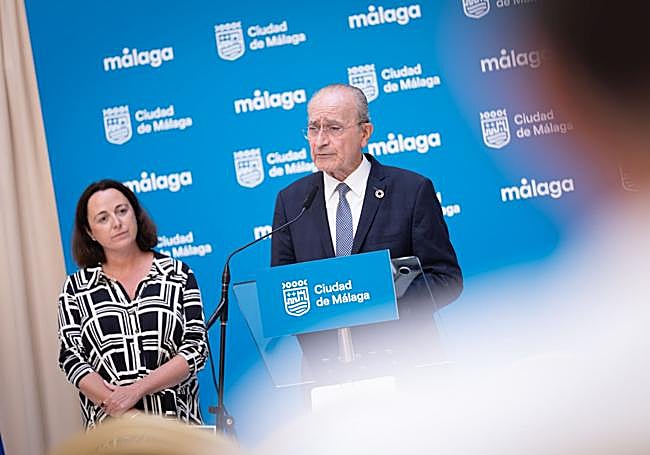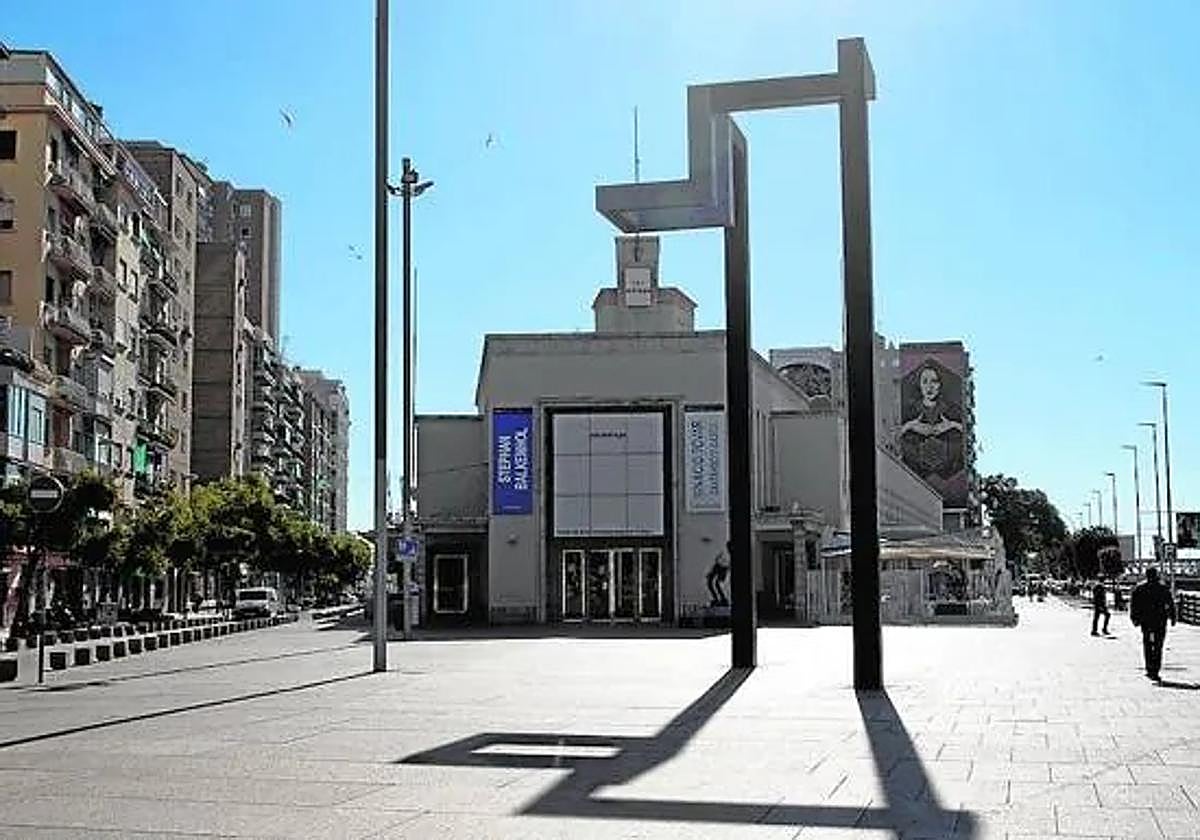Iconic contemporary art centre in Malaga to reinvent itself and reopen in 2026 under a new name after 1.1million euro refurbishment
The city council has made a complete U-turn, taken on the 27 employees at the privately-managed CAC Málaga and announced bold plans for the future
Just two days before the CAC Málaga contemporary art centre in the city closed its doors to the public due to end of the contract for its private management concession, the city council finally unveiled its plans for the future. It will bring the CAC - an arts centre that truly laid the foundation stone over 20 years ago for a Malaga that has become known as 'the city of museums' - into the public domain to come under city hall control. The main moves in the public management scenario for this cultural institution are, firstly, that it will be reinvented and expanded by absorbing the MUPAM municipal heritage museum, so it will be renamed MuCAC Málaga. Secondly, it will have three venues: the old wholesale market (Mercado de Mayoristas), the rooms of La Coracha that have already been jointly managed in recent years and then the museum itself on Paseo de Reding. All these spaces require refurbishment work that has been initially budgeted at 1.1 million euros, which means that the reopening of the new facilities will be delayed until the first quarter of 2026.
At an emergency press conference held last Friday morning it was revealed that the new reorganisation of the CAC will also affect its organisational structure and staff, who will now not be laid off on 18 September, the last day of the concession to the company Cultural Management and Communication, which has run the centre since it was founded 21 years ago. In a complete U-turn of the official position to date Malaga's mayor himself, Francisco de la Torre, who until now had argued that he could not substitute those staff contracts as the city hall was not a company, has announced that the 27 employees of the centre will be integrated into the agency that manages the Casa Natal de Picasso, the Pompidou and the Russian Museum as "non-permanent long-term employees."
So, a solution to the labour conflict that had arisen over the taking into municipal ownership of this cultural centre and which was communicated to all staff on Friday morning, according to the mayor, who expressed his "joy" at this final settlement. The entire staff will join the city hall on 19 September, after the concession has expired and they will cease to work as employees of Cultural Management and Communication.
In addition, the mayor announced an open selection process to choose the next director of the MuCAC Málaga, which will be part of the city council's museums department. However, the head of the latter, José María Luna, will only act as manager of the future exhibition institution, while the person chosen to direct the former CAC will have "autonomy" for the artistic direction of the centre. This is according to the councillor in charge of culture, Mariana Pineda, who has been the architect behind this rescue of the CAC so that it can continue in this new form with a change of management model without an intermediary private company.
The MuCAC's annual budget will be around 3.9 million euros, including the combined resources of the CAC and MUPAM
Behind us is a period with brilliant chapters and epoch-making exhibitions - the Chapman brothers, Anish Kapoor, Marina Abramovic, Obey, D'Face, Louise Bourgeois, Julian Opie and Neo Rauch, among others - but also a management marked by controversy and the good times and the darker times that have accompanied Fernando Francés, founder of the concessionary company and curator of all the exhibitions until the last day. However, Malaga council has opted to break with this past and "take a step forward" to tackle this "overhaul" of the project to convert it into a "museum, which is an institution that goes beyond an arts centre," said Pineda.
The company holding the CAC concession has stated that it has not received any communication about the new situation of its staff and regrets that the "prestigious brand" of the exhibition centre is being eliminated
For their part, the concessionary company Gestión Cultural y Comunicación assured SUR on Friday that they had not been informed by Malaga city council of the change of position with its employees, as well as expressing their surprise at the new name for the centre. "The CAC is a prestigious brand in contemporary art with two decades of history and all of a sudden it's being taken away with the stroke of a pen," commented José Luis Díez, manager of the concession.
More exhibitions
In terms of the scheduling of events, the person in charge of the future MuCAC will have to organise around fifteen temporary exhibitions per year and develop a project that will multiply the current workload. He or she will not only have to curate the CAC's main gallery at the old wholesale market (affectionately known as CAC HQ Central) and the annexes of La Coracha as has been done until now, but also the MUPAM, which has been rather lost for years with no clear exhibition plans or overall cultural, artistic direction. Furthermore, the specifications for the selection of the director require, among his/her exhibition priorities for this new stage in the CAC's future, giving attention to local artists (both local to Malaga and to Andalucía) as well as putting the focus on what art is coming from the two continents strategically linked to Malaga: Latin America and Africa.
Malaga city council "takes a step forward" to face the "overhaul" of the project and turn it into a "museum, which is an institution that goes beyond an arts centre"
As for the art collection itself, its expansion has also been announced. Over the last 21 years, the policy of purchases and acquisitions has enabled 632 pieces to be brought together and transferred to the MuCAC. They also hope to add the Carmen Riera collection, which is being negotiated so that it can continue to form part of the permanent collection. In addition, talks are underway to incorporate new collections, through deposits and donations, and the so-called Espacio Foto (Photo Space) has already been planned, which will dedicate a room exclusively to photography in the current MUPAM as this artistic discipline lacks its own facilities in the city.
All this ambitious reorganisation and reviewing of the former municipal spaces of the CAC, the Coracha and the MUPAM is intended to be done with the same resources as before, although they will be bringing together all the budgets of each institution. Thus, as explained by culture councillor Pineda, her department will continue to devote the 3.2 million euros per year that was managed privately by Gestión Cultural y Comunicación, to which will be added between 600,000 and 700,000 euros that are currently invested in the Municipal Heritage Museum. The new MuCAC budget will therefore be around 3.9 million euros per year. In the case of the Pompidou, the cost from 2025 onwards will be 2.7 million euros per year for the use of the Parisian brand name and the management of the collections and exhibitions.

Zoom

Another important aspect of the press conference given by Malaga's mayor and the councillor in charge of culture was to say more about the CAC's reopening and refurbishment. Without stating the final budget for this reworking of the building as the building will not be handed over to public hands until 18 September, the investment currently being considered is 1.1 million euros for the refurbishment of the Mercado de Mayoristas (the old wholesale market), which has been in operation as this arts centre for 21 years without any major work. The council's urban planning department will be responsible for this renovation that, in addition to completely replacing the air-conditioning system that has caused so many problems and expense in recent years , will also have to solve the sanitation and leak issues in the washrooms. It also needs to completely repaint the building inside and out, adapt the storerooms, create a new artists' laboratory space next to the library, renovate the lighting and provide new toilets for the restaurant and the bookshop so that users do not have to go inside the museum facilities.
This significant renovation and change of concept will also put an end to free admission to the centre. Pineda stated that they are considering charging an entrance fee from 2026 when it reopens as MuCAC although, while the centre continues to operate in 2025 using the rooms of La Coracha and MUPAM, it will stay open to the public without charge. However, she assured us that the museum will continue to have free openings every week in the future, which could be on Sunday afternoons or at certain times of the day.
Back in June, SUR was questioning what would happen to CAC Málaga once the private management contract came to an end - was CAC dead? Well, last Friday such reflections were confirmed with the city council announcing its break with the private management of the institution and the complete overhaul of its management model and institutional concept. Yes, the CAC is dead, long live the MuCAC.

